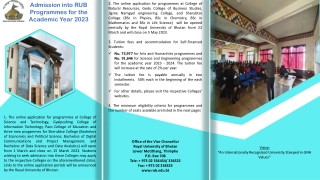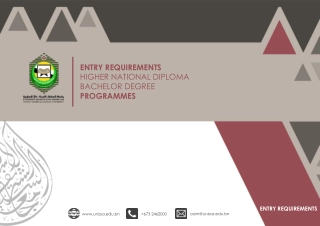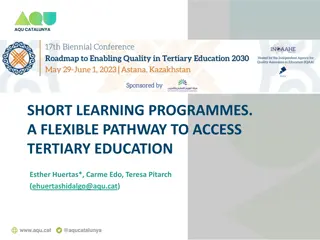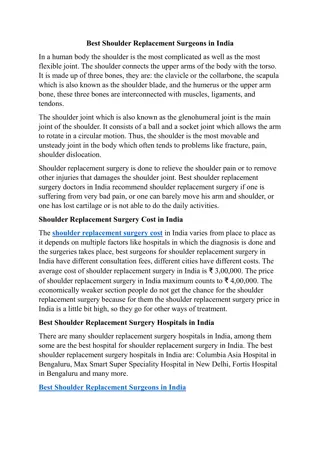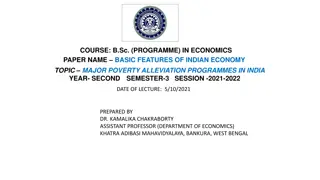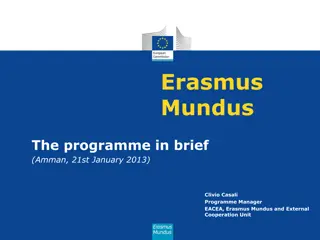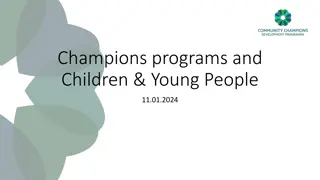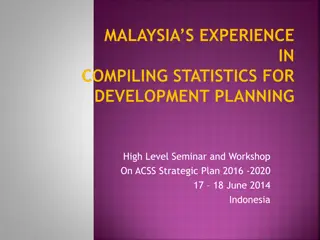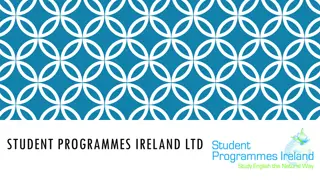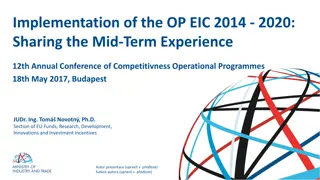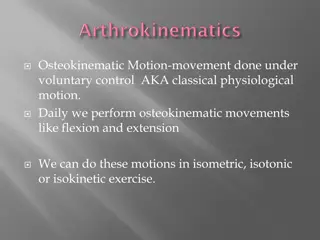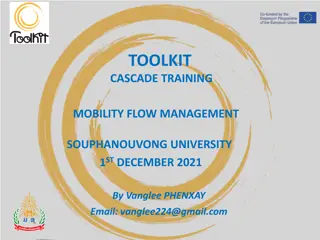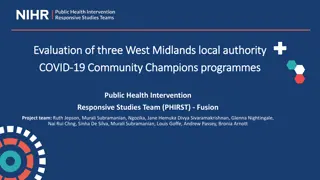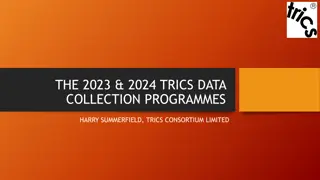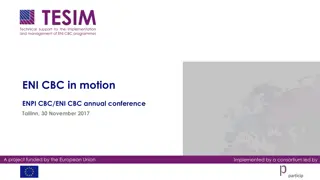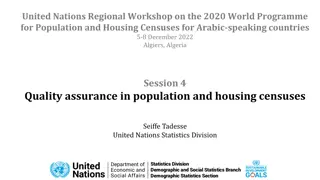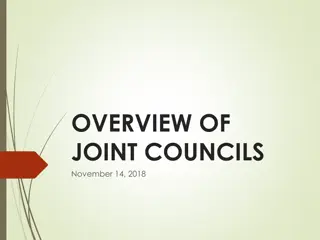
Joint Study Programmes Overview - International Collaboration
Joint study programmes involve international collaboration between higher education institutions from different countries, offering added value through joint diplomas and shared responsibilities. The programmes come with basic requirements, consortium agreements, and clear guidelines for successful implementation.
Download Presentation

Please find below an Image/Link to download the presentation.
The content on the website is provided AS IS for your information and personal use only. It may not be sold, licensed, or shared on other websites without obtaining consent from the author. If you encounter any issues during the download, it is possible that the publisher has removed the file from their server.
You are allowed to download the files provided on this website for personal or commercial use, subject to the condition that they are used lawfully. All files are the property of their respective owners.
The content on the website is provided AS IS for your information and personal use only. It may not be sold, licensed, or shared on other websites without obtaining consent from the author.
E N D
Presentation Transcript
USAF CONFERENCE ON HIGHER EDUCATION Reinventing South Africa s Universities for the Future NEW PRIORITIES FOR THE COUNCIL ON HIGHER EDUCATION 02 October 2019 Prof Narend Baijnath - CEO
LEGAL STATUS OF THE CHE An independent statutory body established by the Higher Education Act (Act No. 10 of 1997), as amended A Quality Council (QC) for higher education in terms of the National Qualifications Framework (NQF) Act (Act No. 67 of 2008) A Schedule 3A public entity in terms of the Public Finance Management Act (PFMA) (Act No. 1 of 1999), as amended
MANDATE IN TERMS OF THE HE ACT 1. Advise the Minister responsible for Training on higher education matters Higher Education & 2. Through its permanent committee, HEQC: promote quality assurance in higher education audit the quality assurance mechanisms of HEIs accredit programmes of higher education 3. Monitor the higher education system & publish info about developments on a regular basis 4. Organise & host conferences on higher education themes
MANDATE IN TERMS OF NQF ACT Develop & manage the HEQSF Advise the Minister on matters relating to the HEQSF Ensure that level descriptors of NQF level 5 to 10 remain current & appropriate Develop & implement policies that seek to advance & facilitate realisation of the objectives of the NQF Develop & implement quality assurance system for the sub-framework Maintain a database of learner achievement Submit data from the database to the National Learners Records Database (NLRD) held by SAQA
MANDATE IN TERMS OF NQF ACT Conduct & publish research on issues of importance to further development of the HEQSF Promote awareness of the NQF & the HEQSF among all stakeholders including the general public Conduct or commission and publish research on issues of importance to the development and implementation of the sub-framework Inform the public about the HEQSF Perform any other function required by the NQF Act.
RELATIONSHIP WITH THE HE SECTOR Consultation on critical matters at all levels Common cause on matters of mutual interest e.g. joint Statement on Ethical Research and Scholarly Publishing Practices Joint initiatives, research, colloquia, priorities for HE Peer experts on all aspects of the work of the CHE advice, research, accreditation, standards development, reviews, audits, quality promotion
RELATIONSHIP WITH DHET The DHET processes nominations & appointments of Council members Government funds for the CHE are channelled through the DHET The CHE s reports & other submissions to government are channelled through the DHET DHET is represented on Council, HEQC & EXCO Policy documents developed by DHET are submitted to the CHE for review & advice before gazetting The CHE & DHET collaborate in key areas, for example, on HEMIS, tackling sectoral issues, NQF and related policy development
RELATIONSHIP WITH PCHEST PCHEST is a committee of Parliament It plays an oversight role over the CHE on behalf of Parliament It requires the CHE to present to it its Strategic Plan, APP, budget & Annual Report and/or other matters within the higher education, science and technology system If PCHEST has concerns regarding CHE, the sector or individual institutions related to the CHE mandate, it has the authority to summon Council to account
BIG SYSTEMIC ISSUES THAT INTERSECT WITH THE WORK OF THE CHE [NPPSET] Quality of teaching, learning and support Skills and competencies resonant with societal and business needs Foundational and extended curricula as key strategy to improve throughput and success Integrated approach to capacity development UCDP student, staff and curriculum [QA implications] Quality improvement through better planning, resourcing, support and responsiveness Enrolment planning national and regional needs, data, trends - HEMIS, FETMIS, SETMIS, CETMIS, systems linked and integrated data simplified and collection systematised]
6 SYSTEM LEVEL GOALS 1. Integrated System of PSET Streamlined regulation [roles and functions of QCs and SAQA refined - reduce duplication and improve efficiency] Qualifications vs programmes clarify bases for accreditation/registration Reduction in complexity and proliferation of qualifications Simplified NQF Improved articulation between institutions [remove barriers to articulation] Aligned legislation and policy [review all legislation and align]
6 SYSTEM LEVEL GOALS 2. Expand Access Diverse students, spectrum of opportunities PSET spectrum Tracer studies of students pre and post registration Increased enrolments [impact on quality] Equitable participation [Students with physical disabilities, Col, Afr,] Affordable fees Institutional differentiation [mandates, missions, location] Infrastructure to support Teaching, Learning and Research Increased staffing
6 SYSTEM LEVEL GOALS 3. A Responsive PSET Diverse programmes Univ- general formative progs, prof and career-orientated progs incorporating foundational and extended curricula Needs of the world of work 21st C capabilities; graduate destinations Universities to develop appropriate CE policies [CHE to advise on policy, reporting, monitoring and sharing of good practice to integrate these into teaching, learning and research] Enrolment planning responsive to global context; cohort analyses
6 SYSTEM LEVEL GOALS 4. Cooperation between PSET and World of Work Stronger univ/industry partnerships More and consistent WPBL Links to strengthen research and innovation Cooperative relations between employers and PSET
6 SYSTEM LEVEL GOALS 5. Improved Quality Improved Teaching and Learning [ Through making these a planning, mission and reporting priority, strengthening African languages, teaching capacity] Improved Research [more effective models of doctoral studies and supervision] Better governance [Council appointment criteria and codes of good practice] Qualified staff
6 SYSTEM LEVEL GOALS 6. Improved Efficiency and Success of the PSET System Increasing throughput, success, employability Reporting and cohort analysis Data on student destinations Learner support Purposeful infrastructure and efficiency grants for LS Improved QA [review of the CHE, new cycle of audits/reviews] Improved infrastructure maintenance
MINISTERIAL GUIDELINES Proliferation of qualifications/ duplication, and their registration Supporting and guiding HE institutions to incorporate RPL, CAT and articulation into academic planning Decolonisation/transformation inclusion of indigenous knowledge Changes to policy for recognition of qualifications and part qualifications Mechanisms for mobility within and across frameworks Backlogs in accreditation Parity of esteem among and between qualifications
MINISTERIAL GUIDELINES Data on misrepresented qualifications Mechanisms to remove exclusionary and anti-transformative practices by prof bodies Data on certification/accreditation backlogs Reports on progress on incomplete activities from previous Ministerial Guidelines
OTHER CONCERNS OF THE CHE 4th Industrial Revolution (IR) and enabling conditions for leveraging possibilities Non-aligned Programmes Priorities for Advice Initiating relevant research to inform advice Changing shape of Higher Education - unbundling, online, private, NGO, cross border [QA] Greater streamlining, integration, efficiency and coord in regulatory universe Graduateness and QA for 4th IR Gender-based violence and rape on campuses
QA CHALLENGES IN THE HE SECTOR Relevance and quality of HE programmes (4IR) Graduate attributes and employability (4IR) Uneven institutional quality governance, stability Social inequities decolonisation, inequities, transformation Access (epistemological) and success Student experience e.g. violence, accommodation, funding Technology and modes of provision
PRIORITIES Revitalisation of the CHE and recapacitation i.t.o. research & advice Eradicate silo functioning IQAF Re-introduce audits and simplify accreditation Increase the number of standards developed and national reviews conducted Develop an IQAF recognising differentiation Capacity development for IQA and EQA


